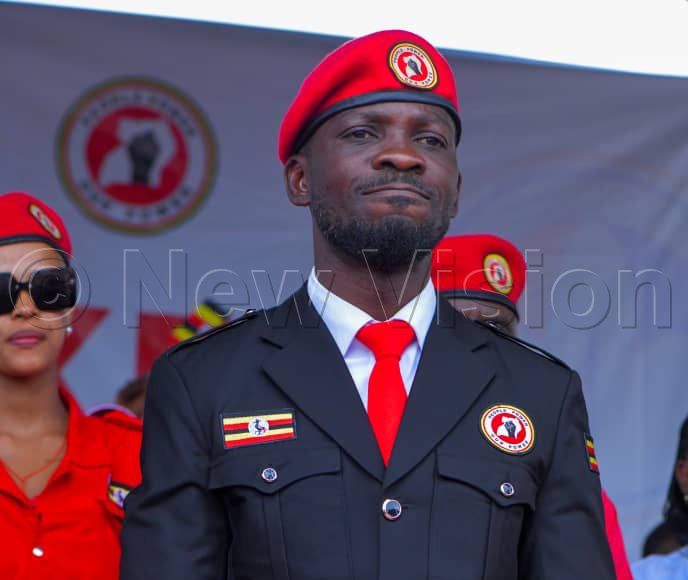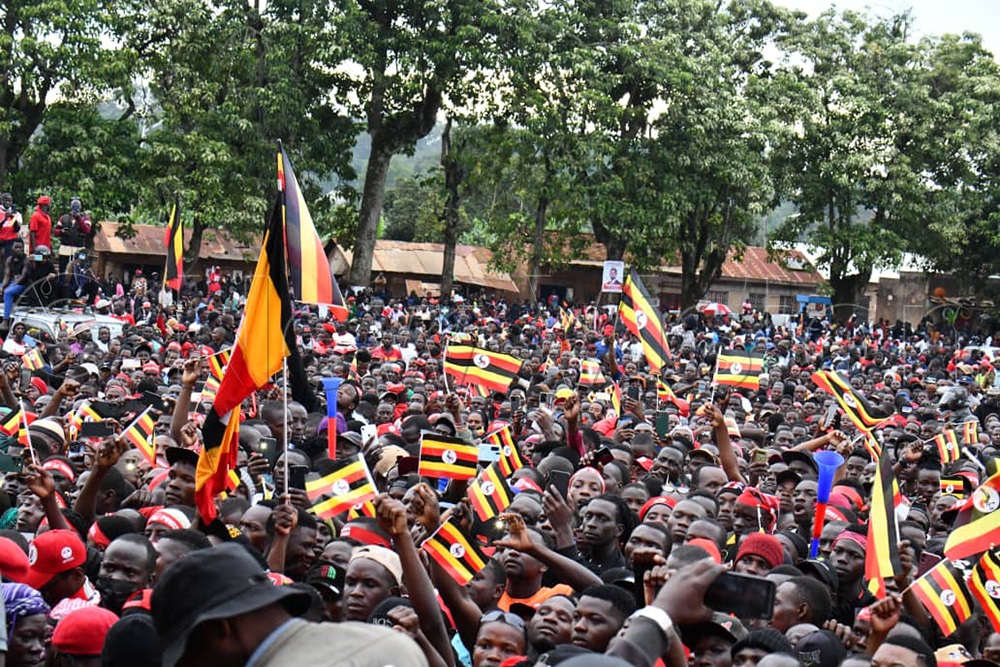Kyagulanyi pledges to create 10 million jobs if elected Uganda President
Kyagulanyi said that the National Resistance Movement (NRM) government is responsible for many potential jobs being lost due to endemic corruption, noting, "they are stealing 10 million trillion."
National Unity Platform (NUP) presidential candidate Robert Kyagulanyi Ssentamu aka Bobi Wine addressing supporters.
________________
National Unity Platform (NUP) presidential candidate Robert Kyagulanyi Ssentamu aka Bobi Wine, has promised at least 10 million jobs if elected president in 2026.
The Opposition leader says the jobs will be created in the first five years of his government to help ease the country's unemployment crisis.
Statistics from the National Planning Authority (NPA) indicate that at least 700,000 young people join the job market every year. However, only about 238,000 are absorbed.
Relatedly, unemployment among those Not in Education, Employment, or Training (NEETs) has doubled, from 2.5 million in the 2012/2013 financial year to 4.2 million in the 2022/2023 financial year.
Speaking during a campaign rally at Busubizi Playground in Mityana district on Monday, October 6, 2025, Kyagulanyi said the high unemployment rate forces many youth to seek jobs out of the country, including in the Middle East where working conditions are akin to slavery.
"I am told up to three bodies are returned at Entebbe airport every month, some with missing body parts," he said.
He said that the National Resistance Movement (NRM) government is responsible for many potential jobs being lost due to endemic corruption, noting, "they are stealing 10 million trillion."
“Uganda’s young people are hardworking and innovative, but they lack opportunities. Under our government, we shall turn their energy into productivity by creating 10 million decent jobs within the first five years,” Kyagulanyi said to cheering crowds.
National Unity Platform (NUP) presidential candidate Robert Kyagulanyi Ssentamu aka Bobi Wine.
The NUP leader accused NRM under President Yoweri Museveni of presiding over an economy that benefits only a few while leaving the majority of Ugandans in poverty.
How realistic is 10 million jobs in 5 years?
According to a National Planning Authority 2022 report, during the second National Development Plan (NDPII) period (2015/16 and 2019/20), Uganda’s economy created approximately 1,600,000 jobs. This translated into an average of 320,000 new jobs created per year. The new jobs created reached the peak in FY2017/18 during the NDPII period, resulting in the creation of approximately 420,000 new jobs before dropping to 392,000 in FY2018/19 and eventually to 263,000 jobs in FY2019/20. The study established that employment expanded by an average of 33% in the first three years of NDPII but dropped at an average of 20 percent per annum in the last two years of the plan on account of the COVID-19 pandemic that hit the global economy, and employment is yet to recover fully.

NUP supporters at the rally.
"There is an absence of mechanisms and systems to measure, monitor and track job creation as a key performance indicator of the government. It is reported that you cannot create what you do not know! In advanced economies, there are developed systems and mechanisms that enable the government to monitor and track job creation/job losses or destruction on a more regular basis, such as daily, weekly, monthly and quarterly. However, in Uganda, even the “annual jobs report” is still far from reality, and annual job creation is reported with a lot of caution as it mostly comes from estimations based on irregular and old statistics," the planning authority says in the report.
Formal employment in Uganda is estimated at about one to two million jobs, with the Government accounting for about half a million jobs. The vast majority of employed Ugandans are in the informal sector, including subsistence agriculture, small trade, or casual labour.
Therefore, creating 10 million jobs in the next five years is extremely ambitious because of the big structural, economic and logistical challenges the country faces, according to a New Vision Online analysis. This makes the ambition unrealistic, considering Uganda's current economic structure and resources, even with sustained political will, smart policies and significant investments.
Buganda region
Yesterday's campaigns marked the start of Kyagulanyi's Buganda region tour after he had combed Busoga for votes last week. The opposition leader highlighted the identical nature of the challenges facing both regions.
"When I talk about oppression, it is affecting everyone in the country. They don't want me to meet you. They know when I look in your eyes and you look in my eyes, there can be a connection," he said.
"Therefore, I am here to tell you not to accept being oppressed. Despite the challenges, including brutal acts and arrests against our people, I am here to tell you we have not given up."
On Tuesday, Kyagulanyi is set to campaign in Mubende and Kasandah.